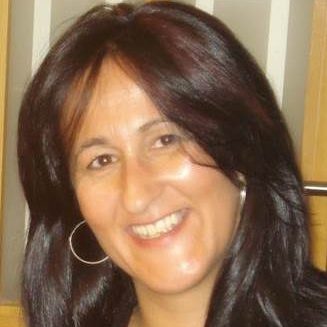Available at
Almada / Lisbon

Cristina Gonçalves
Vila Nova de Gaia / Oporto
Orquídea Campos
1st Year
| UC – Annual | CH | ECTS | |
| Supervised Teaching Traineeship in Early Childhood I | 20 TP | 100 SE | 10 OT | 12 |
| UC – 1st Semester | CH | ECTS | UC – 2nd Semester | CH | ECTS | |
| Knowledge of the Physical and Social World | 34 TP | 3 | Ethics and Professional Development (1) | 30 TP | 2 | |
| Integrated Expressions | 40 TP | 3 | Pedagogy and Didactics of the Oral Language and Writing | 40 TP | 4 OT | 6 | |
| Personal and Social Education | 30 TP | 3 | Pedagogy and Didactics of Mathematics | 40 TP | 4 OT | 6 | |
| Oral Language and Approach to Process Writing | 40 TP | 3 | Pedagogy and Didactics of Integrated Expressions | 40 TP | 4 OT | 6 | |
| Mathematics in Early Childhood | 40 TP | 3 | Pedagogy and Didactics of the Knowledge of the Physical and Social World | 40 TP | 4 OT | 6 | |
| Curricula Organization and Development | 36 TP | 4 OT | 4 | Community Intervention Projects (1) | 30 TP | 2 | |
| Educational Psychology | 30 TP | 3 |
(1) Optional – choose 1 unit
2nd Year
| UC – 1st Semester | CH | ECTS | |
| Special Education Needs and Curricula Differentiation | 30 TP | 2 | |
| Supervised Teaching Traineeship in Early Childhood II | 20 TP | 300 SE | 20 OT | 23 | |
| Education Research Seminar | 30 TP | 20 SE | 5 |
UC – Curricular Unit | CH – Workload | ECTS – ECTS Credits | T – Theoretical | PL – Practical and Laboratory | TP – Theoretical/Practical | SE – Seminar/Internship | OT – Tutorial
Admission requirements
Holders of the undergraduate (Licenciado) degree in Basic Education.
In order to comply with the provisions of Art. 17, Decree-Law n. 79/2014, dated May 14, 2007, the means for assessment of Portuguese Language domain skills and of essential rules of logic and argumentation rhetorical and critical domain, according to applicant profiles, will be:
- the training done in higher education in the field of the Portuguese Language, namely the type of the completed CU(s) and their average grades;
- their professional CV;
- written and oral test.
Obtenção de Diploma
Para a conclusão do 2.º ciclo de estudos em Educação Pré-Escolar, o estudante deverá cumprir um plano curricular constituído por 90 créditos ECTS obrigatórios:
- 50 créditos ECTS no curso de especialização;
- 40 créditos ECTS referentes às unidades curriculares de Prática de Ensino Supervisionada e Seminário de Investigação em Educação.
O mestre em Educação Pré-Escolar deverá evidenciar competências para:
- Conceber e desenvolver o currículo planificando, organizando e avaliando o ambiente educativo, as atividades e o projeto curricular;
- Dominar as metodologias de observação, planificação e avaliação com vista à adequação das necessidades das crianças e dos objetivos de desenvolvimento e aprendizagem;
- Promover um ambiente favorável ao estabelecimento de relações interpessoais criança-adulto e criança-criança de forma a promover a segurança afetiva, a autonomia e a cooperação;
- Fomentar a curiosidade, a capacidade de realização de tarefas e de resolução de problemas;
- Favorecer o desenvolvimento pessoal numa perspetiva de educação para a cidadania;
- Envolver a família e a comunidade no processo educativo;
- Autoavaliar-se, refletir sobre o seu desempenho e reconhecer a necessidade de formação contínua;
- Fundamentar científica e pedagogicamente a sua intervenção educativa.
Accreditation / Evaluation
Almada
- Accredited by the A3ES – Portuguese Higher Education Evaluation and Accreditation Agency
- Published: 25/05/2015
- Decision of the A3ES Board of Directors
V. N. Gaia
- Accredited by the A3ES – Portuguese Higher Education Evaluation and Accreditation Agency
- Published: 25/05/2015
- Decision of the A3ES Board of Directors
Career opportunities
Teaching in Early Childhood, in public and private education.
Professional title
Early Childhood Educator.
Jean Piaget Higher School of Education of Almada
Registered at the Directorate-General of Higher Education (DGES – Direção-Geral de Ensino Superior) with n. R/A-Cr 121/2015, and published in the Official Journal (Diário da República), Ministerial Order n. 9048/2015.
Jean Piaget Higher School of Education of Vila Nova de Gaia
Registered at the Directorate-General of Higher Education (DGES – Direção-Geral de Ensino Superior) with n. R/A-Cr 120/2015, and published in the Official Journal (Diário da República), Ministerial Order n. 9809/2015, dated August 27, 2015.
3 semesters • 90 ECTS credits
Further studies
Master’s degree gives access to doctoral studies in terms and under the conditions of the currently valid legislation.
Study area
Teacher Training – Pre-Primary Education
Assessment
The purpose of the student’s assessment is to evaluate his/her achievements in the acquisition and development of knowledge and competences defined in the Curricular Units syllabi.
Thus, assessment methods and instruments are adapted to the specific objectives, characteristics and contents of the corresponding Curricular Unit, and assessment is carried out in accordance with the currently valid Attendance and Assessment Regulations.
There are two main types of assessment: Continuous Assessment, which assesses the student’s work over an academic period (semester / quarter / year), e.g. his/her participation in the Curricular Unit activities, individual and/or group assignments, oral and written tests, etc., and Assessment by Exam, which assesses only the student’s performance at the exam he/she sits for.
RAZÕES PARA ESTUDAR
EDUCAÇÃO PRÉ-ESCOLAR
- Quase 40 anos de experiência em formação de educadores de infância;
- Possibilidade de frequência em regime pós-laboral;
- Métodos de ensino interativos e dinâmicos;
- Acompanhamento de perto por equipa de excelência de docentes;
- Almada: Excelente localização: 1 min. da estação do Pragal e 10 min. de Lisboa;
- V. N. Gaia: Transfer gratuito entre comboio e campus.
